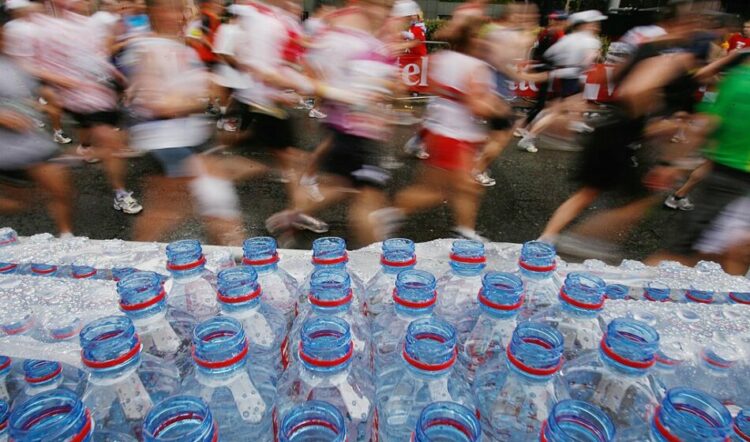Running events have an elephant in the room when it comes to the climate emergency, says trail runner Damian Hall in his new book, and it’s the participants who need to take the greatest action
My first running race, the 2011 Bath Half-Marathon, was a life-changing moment for me as it is for many. I took real pride in that first finisher t-shirt and medal, oblivious to the unnecessary environmental costs (more anon). I felt a little uncomfortable with the fields of plastic bottles and gel wrappers scattered down the road in our wake. It all gets collected for recycling by the lovely volunteers later, right?
As well as creating some 40,000 medals and 40,000 t-shirts, the 2018 London Marathon used 920,000 plastic bottles. That’s not far off one million plastic bottles. For just 40,000 runners. Post-race the City of Westminster collected 5200 kilograms of rubbish and 3500 kilograms of recycling from the streets, including 47,000 plastic bottles – hopefully the other 873,000 were collected by race staff? Things have improved since, but London Marathon acknowledged a stunning 118.86 tonnes of waste.
Around 10 million tonnes of plastic ends up in the oceans each year in what Sir David Attenborough has described as an “unfolding catastrophe”. Race bibs are usually plastic, timing-chip paraphernalia too, course markers and then there are those plastic goodie bags. They’re not good. More stuff no one wants. More waste. More CO2e sent skywards, heating our planet, making it potentially unliveable for our children and their children.
I used to take the free t-shirt offered to me at race finish lines without even thinking, stick it in a drawer and forget all about it. A total of 75 per cent of UK runners often or very often receive a post-race t-shirt and 60 per cent own 10 or more, says research. A few unused tees aren’t a big deal though, are they? Unfortunately running has an XXL t-shirt waste problem.
“All those discarded bottles, half-eaten bananas and cheap t-shirts … Are running events an environmental disaster?” asked Kate Carter in The Guardian.
“It is hard to think of a better formula than a global sporting event for causing maximum environmental damage,” said author and activist George Monbiot. And we haven’t even got to the elephant in the room.
The London Marathon is making progress. In 2019 it used 215,000 fewer plastic bottles and along with hundreds of UK and US races, London Marathon Events (LME) has partnered…
CLICK HERE to Read the Full Original Article at AW…

